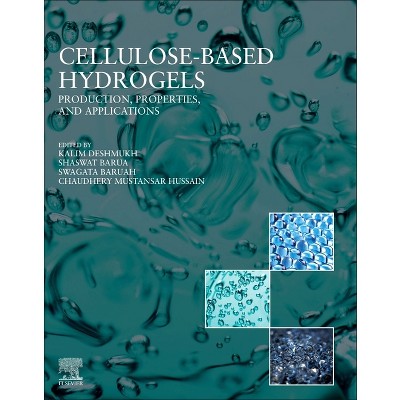Molecularly Imprinted Polymers (Hussain) Epub - by Chaudhery Mustansar Hussain & Rüstem Keçili & Chaudhery Ghazanfar Hussain (Hardcover)

About this item
Highlights
- Molecular imprinting, a technique inspired by natural antibody-antigen interactions, allows the creation of synthetic polymers with selective binding capabilities.
- About the Author: Chaudhery Mustansar Hussain, PhD, is an adjunct professor and director of laboratories in the Department of Chemistry & Environmental Sciences at the New Jersey Institute of Technology (NJIT), Newark, New Jersey, United States.
- 374 Pages
- Science, Chemistry
Description
Book Synopsis
Molecular imprinting, a technique inspired by natural antibody-antigen interactions, allows the creation of synthetic polymers with selective binding capabilities. The infusion of carbon based materials into this field introduces a new dimension, leveraging the unique properties of carbon to enhance the design, performance, and applications of these polymers. Carbon-Based Molecularly Imprinted Polymers offers an in-depth exploration of the integration of carbon materials into the molecular imprinting-based smart carbon nanomaterials framework. It covers fundamental principles, design strategies, and performance evaluation of these materials, emphasizing their applications in environmental remediation, biomedical sciences and analytical chemistry. Readers will gain valuable insights into the synthesis techniques, surface engineering, and practical use of carbon-based molecularly imprinted polymers. The book is an essential reference for researchers, academics, and professionals seeking a holistic understanding of this cutting-edge intersection between polymer science and carbon nanomaterials.
About the Author
Chaudhery Mustansar Hussain, PhD, is an adjunct professor and director of laboratories in the Department of Chemistry & Environmental Sciences at the New Jersey Institute of Technology (NJIT), Newark, New Jersey, United States. His research is focused on the applications of nanotechnology and advanced materials, environmental management, analytical chemistry, and other various industries. Dr. Hussain is the author of numerous papers in peer-reviewed journals as well as a prolific author and editor of around One hundred and fifty (150) books, including scientific monographs and handbooks in his research areas. He has published with ELSEVIER, American Chemical Society, Royal Society of Chemistry, John Wiley & Sons, CRC Press, and Springer.
Rüstem Keçili received his MSc degree in Analytical Chemistry from the Anadolu University, Turkey and he earned his PhD degree in Chemistry under Marie Curie Actions from the Technical University of Dortmund, Germany. He worked as an Early-Stage Researcher at MIP Technologies AB (A subsidiary of Biotage AB) in Lund, Sweden. He was a visiting researcher at the University of Manchester, UK. He is currently an Associate Professor and Vice Director at the Department of Medical Services and Techniques, Yunus Emre Vocational School of Health Services, Anadolu University, Türkiye. His multidisciplinary professional background covers green and sustainable chemistry, nanotechnology, advanced materials, molecularly imprinted polymers (MIPs), molecular recognition, MIP-based sensor systems, affinity chromatography and solid phase extraction. Dr. Keçili is the author of numerous research and review papers inprestigious peer-reviewed journals as well as the editor of 1 scientific book, author of2 scientific books and several book chapters published by the American Chemical Society, Royal Society of Chemistry, Elsevier, John Wiley & Sons and Springer.
Chaudhery Ghazanfar Hussain is a research scholar in science and technology, Department of Education, Punjab, Pakistan. His key areas of research are environmental modeling, analytical chemistry, data science, computer networks, and industrial development. He is author of monographs on chemistry, sample pre-treatments, nanotechnology, and software technology. He is a professional and affiliated with several organizations.











